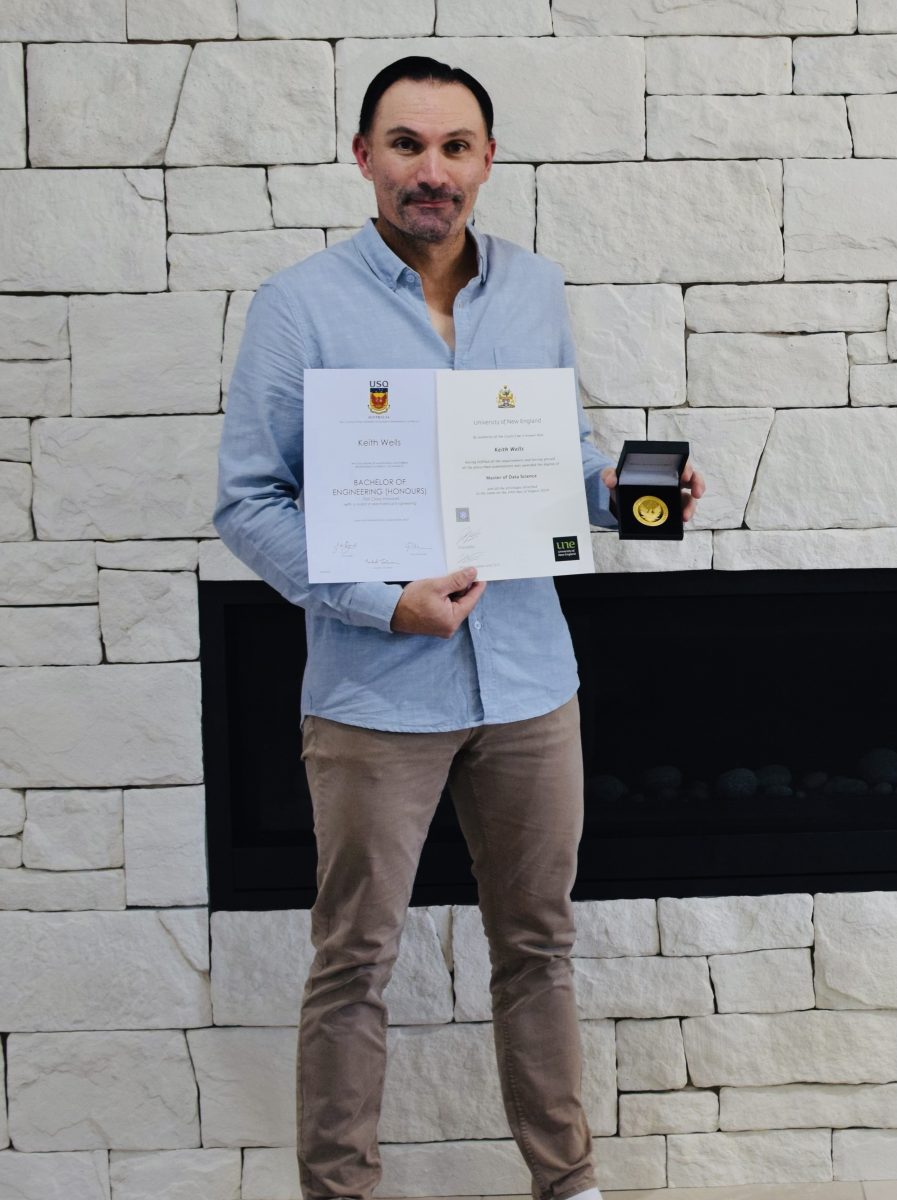
Keith Wells has achieved exceptional academic results over the past two years. Photo: Supplied.
A Griffith teacher has uncovered how machine learning and artificial intelligence (AI) can be used to predict mechanical failure while completing a course of study with record-high results.
Keith Wells graduated with a Master’s of Data Science at the University of New England in August.
He received a high distinction in every subject except for one, for which he got a distinction. This gave him the highest postgraduate grade point average in his faculty of study – the School of Science and Technology.
“Predicting the failure of mechanical components can save lives and prevent catastrophic incidents, especially in critical industries such as rail, transportation, and aviation,” Mr Wells said.
“Artificial intelligence and machine learning are more than just trending catchphrases; they are revolutionising how we understand and interact with mechanical systems. By applying AI and machine learning, we not only predict failures but also prevent them from occurring.”
While his success in academia has come in later life, Mr Wells’ passion for issues he now researches began at an early age.
“I began my professional journey while I was still a student in high school, working weekends and school holidays operating earthmoving equipment such as laser buckets and elevating scrapers. I then worked as a heavy vehicle field service mechanic for 13 years, gaining firsthand experience with the high costs and dangers that can result from mechanical failures.
“My early experiences with earthmoving equipment were not just about operating heavy machinery and repairing equipment, they were my first real encounter with the mechanics of large systems and the consequences of their failures. These early days were instrumental in shaping my approach to engineering – they taught me the importance of precision, reliability, and proactive maintenance.
“This groundwork sparked my passion for engineering and set me on a path to integrating more sophisticated technologies such as AI and machine learning into traditional mechanical engineering practices.
“Working directly with machinery on the ground gave me invaluable experiences that textbooks alone could not offer. This hands-on learning was crucial in informing my academic studies and research, allowing me to address real-world problems with a balanced approach between theory and practice.”

Keith studies for several hours in the evening after his workday. Photo: Supplied.
Last year, Mr Wells was awarded the University Medal at the University of Southern Queensland when he graduated with first-class honours in mechanical engineering, a degree which saw him publish three mechanical engineering papers in international peer reviewed journals in the field of fluid mechanics.
He completed both his degrees remotely from Griffith, doing his studies in the evenings after working his day job as a high school teacher at Murrumbidgee Regional High School (MRHS).
“Over the past 13 years as a high school teacher, I have incorporated the knowledge gained from my studies into the classroom. This approach has enabled me to connect learning with real-life engineering, mathematics, and physics concepts, thereby providing a clear purpose for the content and enriching student learning,” he said.
“By bridging theoretical knowledge with practical applications, my studies and research help me inspire and challenge students, preparing them for their future academic and professional pursuits.”
Mr Wells grew up on a small farm in Darlington Point, where he had positive influences early in his life, including from his uncle, Stan Grant Snr, well known for his tireless efforts to save the Riverina’s Wiradjuri language.
He has also paid tribute to the role his teachers at MRHS (then Griffith High) had in shaping him, including Richard Wiseman and the late Robyn Davis.
“Robyn was a maths teacher who made a big difference to me. She would explain things very explicitly; she knew I lived on a farm with animals and she would use them as analogies.”
A super-fit athlete, he’s also known for his machine-like abilities on the tennis court, where he’s often seen in the early morning hours slogging it out against the town’s best players in rallies that never seem to end.
But his main focus is to continue to break ground in his chosen field of study.
“I am committed to continuing my research, combining mechanical engineering with artificial intelligence and machine learning algorithms to predict mechanical failures more accurately and optimise production processes,” he said.
Anyone interested in studying for a degree remotely while still living in Griffith or Leeton can contact the Country Universities Centre Western Riverina for advice or support.
Original Article published by Oliver Jacques on Region Riverina.


